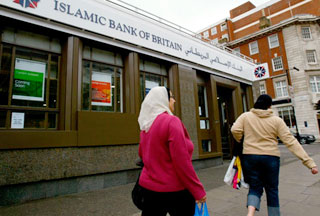"Islamic finance has seen an incredible surge in popularity, based on stronger regulatory regimens and a better international understanding of its dynamics."
|
|
|
Islamic banks are not authorized to invest in companies associated with tobacco, alcohol or gambling. |
07 Sep 2009
Despite the global financial crisis, assets held by the 100 largest Islamic banks in the world raised by 66 percent in 2008 compared with previous year.
A study published by Asian Banker Research magazine says the assets of the Islamic banks increased to a total of $580 billion in 2008 -- up from $350 billion in 2007.
This is while, the assets held by Asia's 300 largest banks lifted by just 13.4 percent, the report says.
"Islamic finance has seen an incredible surge in popularity, based on stronger regulatory regimens and a better international understanding of its dynamics," said Emmanuel Daniel, the magazine's chief.
Islamic banking refers to a system of banking that is consistent with the principles of Islamic law. Islamic law or Sharia prohibits the payment of fees for the renting of money (Riba) for specific terms, as well as investing in businesses that provide goods or services considered contrary to its principles (Haraam).
Islamic banks are not authorized to invest in companies associated with tobacco, alcohol or gambling.
The report concludes that despite the current economic meltdown in the world "Islamic banks have continued to grow in prominence and size”.
The report said Saudi Arabian lenders were more profitable among other banks with Al-Rajhi Bank netting the highest earnings of $1.74 billion, according to the report, and Iranian banks were the biggest players in the global Islamic banking system.
Iran holds seven out of the top 10 rankings and 12 out of the 100 top Islamic banks, the magazine said.
More than 40 percent of the total assets of the top 100 banks belong to Iranian banks, according to the report.
DB/SC/DT
